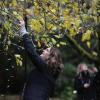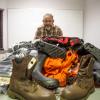March 21, 2007 - 5:00pm
Does every child have the right to be born? It depends who you ask.
In vitro fertilization has been described as one of the greatest inventions of the 20th century, but viewpoints on this and other forms of new reproductive and genetic technologies (NRGTs) range from unquestioning support to the opposite extreme.
“NRGTs have provoked considerable debate over the past 30 years,” says Dr. Eric Blyth, a professor in Health & Social Studies at the University of Huddersfield, United Kingdom, and a keynote speaker at a thought-provoking three-day international conference on NRGTS called Nobody's Child, Everybody's Children hosted by Malaspina University-College in Nanaimo, BC, May 24-26.
During his keynote address entitled To be or not to be?: A Critical Appraisal of the Welfare of Children Conceived through New Reproductive Technologies, Blyth will examine competing perspectives on this much debated and highly controversial topic, including the viewpoint held by some people “that reproductive procedures involving donated sperm, eggs or embryos are seen as little short of child abuse.”
According to Blyth, it’s estimated that over three million children have been born worldwide from a variety of NRGT’s since the birth of Louise Brown in 1978, the first baby conceived through in vitro fertilization.
“We’re all affected by NRGTs,” says Beverly Revin, conference chair and chair of Malaspina’s Early Childhood Education and Care program. “Most of us know someone who has used new reproductive and genetic technologies, whether it’s in vitro fertilization, donor insemination or fertility drugs.
“The purpose of this conference is to explore the multitude of legal, legislative, and medical issues related to the development and implementation of new reproductive and genetic technologies. We expect lively, informative dialogue and debate on all sides of the issues. Our goal is to provide a platform for as many different perspectives and philosophies as possible.”
The conference will appeal to scientists, doctors, nurses, health care workers, counsellors, educators, parents, students and anyone else with an interest in the topic of NRGTs.
Other high profile speakers at the conference include Dr. Elinor Wilson, president of Assisted Human Reproduction Canada, a new agency that will administer and enforce the Assisted Human Reproduction Act. Wilson and Dr. John Hamm, chairof the agency, will participate in an open forum along with other prominent national and international experts such as Maureen McTeer of the Faculty of Common Law, University of Ottawa, Dr. Louise Vandelac, of the Department of Sociology, Université du Québec à Montréal, and Dr. Jeffrey Nisker, of the Schulich School of Medicine, University of Western Ontario. A full conference program and conference abstracts are available online at www.viu.ca/nrgt.
Revin said a conference highlight will be a theatrical performance of A Child on Her Mind, an “exciting and emotionally intense play” written by Jeffrey Nisker and Vangie Bergum, and directed by Catherine Caines of Gabriola Island, BC, which focuses on six women and their experiences with NRGTs.
The conference is hosted by a multi-disciplinary team, including community representatives and faculty from Malaspina’s Nursing, History, International Education, Philosophy, and Early Childhood Education and Care departments, which has been planning this event for two years.
Early bird registration for the three-day conference is $295 until March 30. The fee increases to $375 per person after that. There's a special student rate of $140. To register online or for more information, visit the website at www.viu.ca/nrgt.
Tags: In the Community






